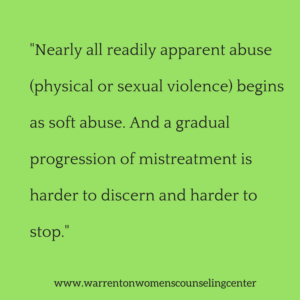Soft Abuse: The Damage of Emotional Mistreatment

As we continue to watch the fallout of the #MeToo movement, most all of us are horrified at the shocking descriptions of physical and sexual mistreatment that a great number of people (mostly women) in Hollywood & politics have experienced. Instinctually, we all know that rape and violence are wrong, and condemning these types of behavior comes quite naturally. Today, however, I’d like to discuss a less overt (and perhaps seemingly less harmful) type of misconduct that is not as easily detectable but still has very damaging consequences; this is what I refer to as soft abuse.
The term “soft abuse” seems like a paradox, doesn’t it? There is nothing at all “soft” about abuse, and yet I use this term to describe a kind of abuse that is more subtle, which can make it more difficult to recognize or challenge. So what exactly does soft abuse entail? It can include controlling behavior, verbal abuse, extreme jealousy or possessiveness, not respecting one’s privacy or belongings, or verbal pressure for sexual contact. Basically anything short of physical aggression that still inflicts great emotional damage on a relationship and a person’s sense of well-being.

Gradual Progression
When we hear of women in abusive situations, it’s easy to think thoughts like “how could she be involved with a man like that?” or “why doesn’t she just leave?” This kind of frustration is understandable, but abusive relationships are very complicated. Nearly all readily apparent abuse (physical or sexual violence) begins as soft abuse. For example, long before a man rapes a woman, he verbally and emotionally abuses her. And a gradual progression of mistreatment is harder to discern and harder to stop. As a woman’s involvement and trust in a man grows, too often, so does his unkind words and possessive nature; it’s not easy to leave a relationship that you’ve possibly spent years investing in.
Abuse Can Be A One-Time Occurrence
When we think of abuse, sometimes we think of repeated patterns of speech or behavior. The truth is, however, that inappropriate action or words spoken doesn’t need to happen more than once for it to be considered abuse. If a man calls you a derogatory term one time, that’s soft abuse that needs to be addressed. If someone is possessive and checks your phone or email without your permission, that’s another incident of soft abuse that needs to be talked about. I encourage women to be observant of these kinds of behavior and to quickly address (and work to resolve) them in order to keep them from escalating.
“He’s Not Always This Way”
[pullquote]It doesn’t feel good to say we’ve been on the receiving end of abuse, and it can be painful to acknowledge that someone we know (and possibly love) was the perpetrator.[/pullquote]In working with clients, I’ve discovered that one of the most difficult parts of the victim’s experience is not necessarily the abuse itself, but also the cognitive dissonance of trying to rationalize the bad behavior of someone who may otherwise have good qualities. If a man was always a monster, a woman would likely have no difficultly condemning him, but because she’s witnessed both the good and the bad in him, things can be all the more confusing, and she may make excuses for the behavior (“he’s not always this way”). It doesn’t feel good to say we’ve been on the receiving end of abuse, and it can be painful to acknowledge that someone we know (and possibly love) was the perpetrator. Additionally, sometimes a conflict-avoidant nature can make us want to shield an abuser from the consequences of his behavior, even at our expense.
It’s never appropriate to place blame on a woman who has experienced abuse, but my hope is that they can learn to recognize soft abuse, then be empowered to speak up, set boundaries, and if necessary, end a relationship.
For Further Reading:
“Dating Abuse: What Parents Can Do To Help Their Daughters”
“Men Behaving Badly: The Root of the Problem”
“Sexual Abuse, #MeToo, and What We Can Do”
Empowering Families By Strengthening Girls & Women
At Warrenton Women’s Counseling Center, we work with girls of all ages (teenagers, adult women, mothers, and daughters). Our work is done face-to-face, online or via phone. We would love to hear from you and help to empower you and/or your daughter.
_______________________________________________________________________________

Michelle Kelley, LCSW is a licensed counselor and owner of Warrenton Women’s Counseling Center. We work with girls and women of all ages. Our motto is to empower families by strengthening girls and women. For more information, call (540) 316-6362 or email Michelle@WarrentonWomensCounselingCenter.com


